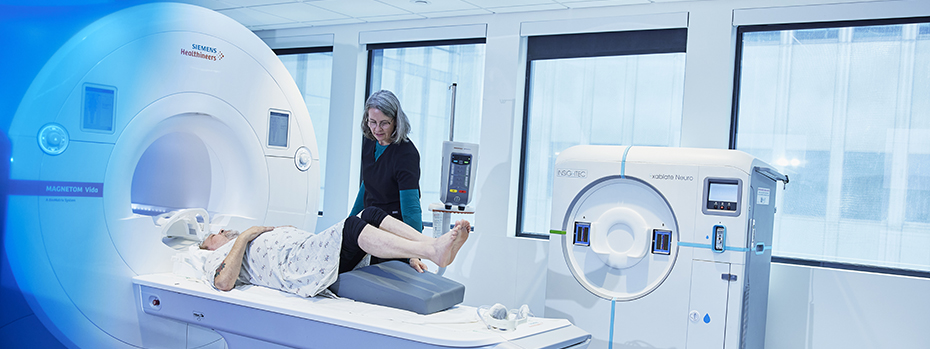MRI (Magnetic Resonance Imaging)

An MRI scan uses a strong magnetic field to create highly detailed, 3D images of organs and systems. An MRI helps your doctor confirm a diagnosis or better plan treatment.
We provide standard and 3T MRI. Your doctor may request 3T MRI to detect smaller body parts and anomalies.
We provide 3T MRI at:
How MRI works
MRI uses magnets, radio waves and a computer to create detailed images of your organs and systems.
MRI safety
We put your safety first with careful screening to make sure you can have an MRI. We have hard-to-find expertise in MRI scans for patients with implants that use electricity or other outside power. These include:
- Chemotherapy pumps
- Deep brain stimulation implants
- Insulin pumps
- Loop recorders
- Pacemakers
- Pain pumps
- Spinal cord stimulators
- Vagus nerve stimulators
Before your appointment
Once you have a request from your doctor, you can call us at 503-418-0990 to make an appointment. We usually schedule you within a month.
You’ll get instructions through MyChart on how to prepare for your scan. In some cases, you may need to stop eating or drinking for several hours. Please follow instructions or we may have to reschedule your scan.
If you’re anxious about being in the scanner, you can ask your doctor to prescribe medication to help you relax. In that case, please bring someone to drive you home.
If you have an implant with a controller, please bring the controller to your appointment. Without it, we cannot do your MRI.
Let us know if:
- You’ll be late or can’t come. We will reschedule you so another patient can have their MRI.
- You’re unable to lie still for more than a few minutes.
- You’re pregnant or think you may be pregnant.
- You have an implant that uses electricity or other outside power.
- You’ve had an injury that left metal in your body.
- You have a strong fear of enclosed spaces (claustrophobia).
At your appointment
Getting ready
You’ll be checked for clothing and items that contain metal. If you need to remove clothing, we’ll give you a gown.
You may be given contrast by IV or to drink. Contrast helps organs and tissues stand out in imaging. If you think you may be allergic to MRI IV contrast, please let us know.
You’ll have a coil put on or around the body part we’re scanning. Some coils look like blankets and others look like frames, depending on the body part they’re designed for. For a brain scan, you’ll wear a see-through helmet.
During the scan
You’ll be scanned while lying on a table that moves in and out of a tunnel-shaped scanner. We have blankets, headphones and cushions for your comfort. You’ll need to keep still. For some scans you may be asked to hold your breath.
Scans are painless and usually take 30 to 45 minutes. We may have to do more than one scan to get the images your doctor requested.
You can talk to us, and we’ll check on you often. In some cases, we can play music or a movie to help you relax. If you get anxious, you can ask to stop. We’ll see if we can use the images we have. We can always schedule you for another scan.
After your appointment
If you’re breastfeeding, you don’t need to pump and throw away the milk.
You’ll get your results through MyChart in two to three days.
Frequently asked questions about MRI
Is an MRI scan loud?
Yes. You will hear loud noises, like knocking.
Why is an MRI scan loud?
During a scan, the metal coils inside the scanner vibrate and echo.
What’s the difference between MRI and CT?
An MRI scan uses magnets and radio waves but not radiation. An MRI takes longer than a CT and can detect things that CT can’t. An MRI is typically better for seeing differences between normal and abnormal tissue.
A CT scan uses an X-ray beam that emits a small amount of radiation. A CT is much quicker and quieter than an MRI. A CT is typically better for seeing the structure of bones and organs.
Which one your doctor recommends will depend on your past imaging, your condition and which scan offers more benefit than risk.
Will I have any aftereffects from an MRI scan?
You may feel mildly dizzy for a few moments after you sit up. You can resume your usual activities right away.
Can I ask for an open MRI?
No. We don’t have an open MRI.
Can I keep my wedding ring on?
You may keep your ring on if it has only gold, silver or platinum or if it has no metal. We recommend taking it off or leaving it at home if you can, to be on the safe side.
Other MRI services at OHSU
- MRI of the heart, to check the size of your heart and how well it’s working
- MRI for babies, children and teens in our Pediatric Imaging program
- Intraoperative MRI (iMRI), for pediatric brain surgery
Locations
OHSU Diagnostic Imaging Clinic, Marquam Hill (OHSU Hospital)
OHSU Hospital, 10th floor
3181 S.W. Sam Jackson Park Road
Portland, OR 97239
OHSU Diagnostic Imaging Clinic, South Waterfront
Center for Health & Healing, Building 1, third floor
Portland, OR 97239
OHSU Diagnostic Imaging Clinic, Beaverton
15700 S.W. Greystone Court
Beaverton, OR 97006
OHSU Health Diagnostic Imaging, Cedar Hills
9775 S.W. Wilshire St.
Portland, OR 97225
OHSU Health Diagnostic Imaging, NE Portland
1800 N.E. Second Ave.
Portland, OR 97212
Free parking for patients and visitors
Refer a patient
- Refer your patient to OHSU.
- Order diagnostic imaging.
- Call 503-494-4567 to seek provider-to-provider advice.
- Share your imaging.